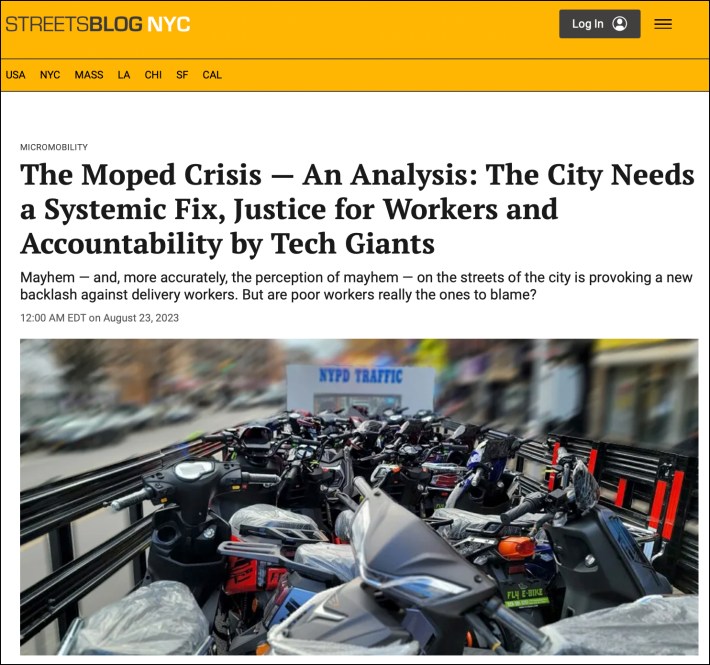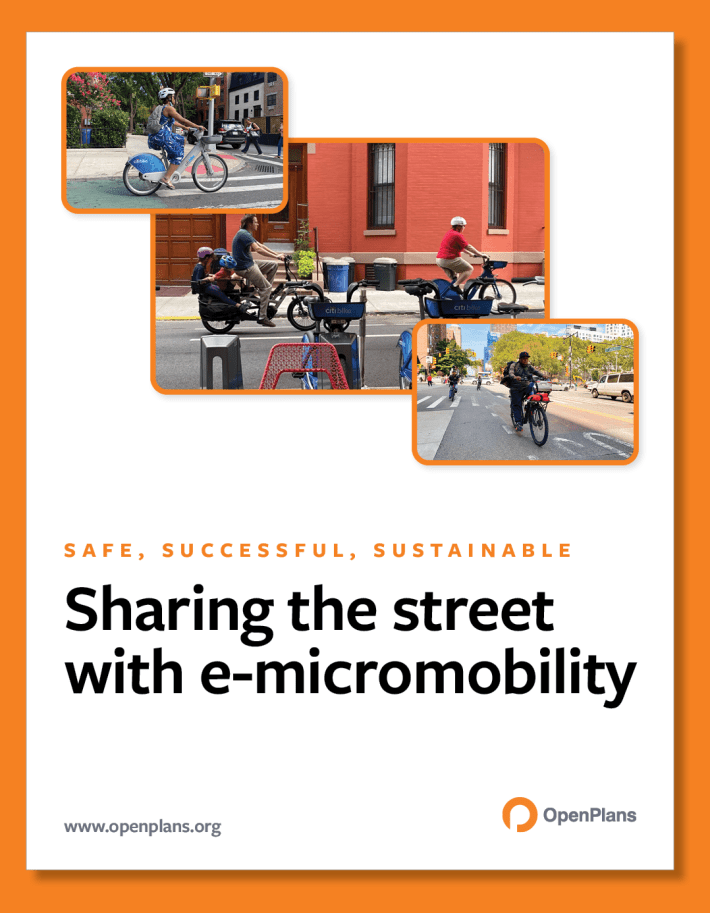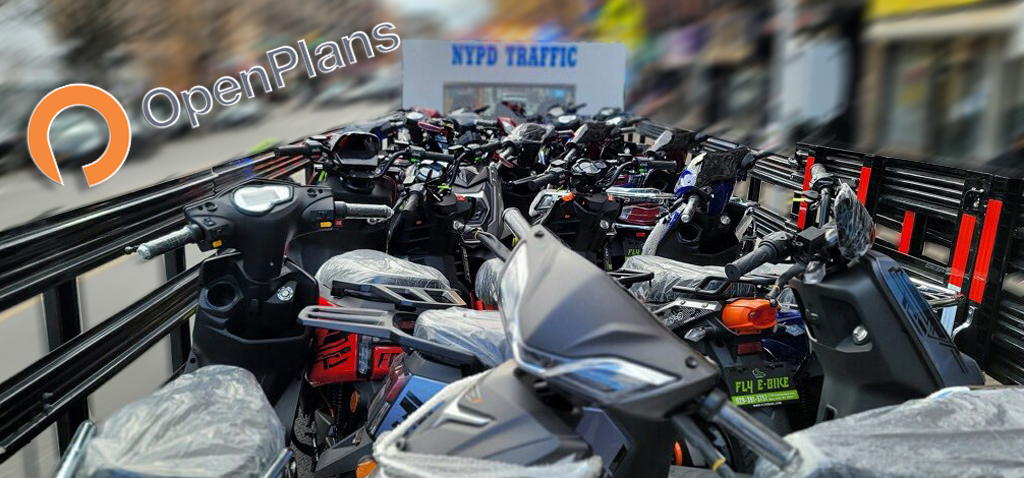Combat, cajole, corral.
The city needs to rein in illegal mopeds with a combination of cracking down on rogue vendors, building safer roads for all users and better educating users while not resorting to broad-stroke enforcement that only kicks the can down the road, according to Open Plans, the livable streets group.

"Reactionary, reductive policies won’t cut it. New York City must pursue strategies that encourage a thriving, equitable e-micromobility culture while ensuring our streets still feel welcoming for pedestrians, traditional cyclists, and all other users," the group, which shares a parent company with Streetsblog, said in a statement.
Like most things related to the streets, the Open Plans policy document focuses on three areas — infrastructure, education, and regulation — that have long been the pillars of street safety.
Infrastructure
With illegal moped riders squeezing into already congested bike lanes, yet also too fearful of riding with faster and heavier cars and trucks, pedestrians and non-electric cyclists are feeling increasingly anxious. And in a rush to make deliveries as quickly as possible, underpaid food app workers, who survive on tips, sometimes ride the wrong way or on the sidewalk.
Open Plans offers a few tips:
- Widen existing protected bike lanes to create more space for micro-mobility, which is ultimately safer in the event of a crash and also produces fewer greenhouse gases. "This treatment unclogs bike lanes while ensuring everyone feels safe and comfortable. It also negates the need for e-bike users to circumvent a congested bike lane by riding on the sidewalk or into car traffic," the group said.
- Convert all painted bike to parking protected bike lanes so that the bike lane is against the curb, reducing the need for cyclists to bike on the sidewalk.
- Make all future bike lanes bi-directional. This will standardize the experience for pedestrians and reduce the likelihood that a bike rider will ride in the wrong direction.
- Create more "people-centric designs" that calm local traffic, such as DOT's bike boulevards, which help pedestrians feel safer.
Education

"The public conversation around electric mobility is currently driven by a combination of misinformation, overreaction, and justifiable frustration," the group said in its document, "Sharing the street with e-micromobility." "The tendency is to lump all e-micromobility together with blunt rhetoric and policy. But e-bikes are not mopeds; they don’t impact our streets in the same way and should not be treated as such."
That's easy to say, but neighborhood groups and their political leaders do indeed paint with a broad brush, demonizing all forms of mobility very differently. E-bikes, for example, are seen as a prime villain of the new E-Vehicle Safety Alliance, when, in fact, car and truck drivers injure far more people than do the riders of electric bikes.
Of course, as the group states, "e-bike riders must understand that they should use bike lanes whenever possible and should never ride on the sidewalk" and "Mopeds ... which must legally be registered and have license plates, must use the vehicle lanes and follow all the rules that apply to cars," but beyond that, the group is advocating for other ways to bridge the knowledge gap:
"Compliance ... will hinge on cooperation from retailers, users, and city agencies," the group said.
But "education" also applies to the big elephant in the mobility room: The app giants that treat the city's 65,000 delivery workers as "independent contractors" so that the companies can disassociate themselves from how their delivery mandate plays out on the ground.
Open Plans is advocating for a requirement that app companies "verify that the devices used for delivery are legal and properly registered, as required by [existing] law," the group said. Currently, the companies say that they verify, but admit there are loopholes, Streetsblog previously reported.
Open Plans says it sees app companies as "collaborators" in solving the problem, but only if the companies use their "purchasing power to financially support delivery workers procuring e-bikes or mopeds from a list of approved, legal retailers" and "provide training ... about the rules of the road and safe usage."
Regulation
Enforcement doesn't have to mean — and, indeed, shouldn't mean — random crackdowns on moped users. Targeted enforcement is what's needed here, the group said.
"Ensuring that riders are using safe, legal vehicles begins at the point of sale," Open Plans said in a statement. "This approach addresses the issue at its root and is preferable to relying on policing, which can be discriminatory, ineffective, and would disproportionately affect hard-working Black and brown New Yorkers."
Here are the group's highlights:
- Shut down illegal moped dealers. The Department of Motor Vehicles has the authority already, though it lacks manpower. That's why Open Plans is advocating for a stronger role for the city Department of Consumer and Workplace Protection, which will start enforcing battery regulations when they go into effect on Sept. 16. The bottom line? "Shut down businesses that knowingly sell illegal devices," the group said.
- Current laws allow vehicle dealers — even registered ones — to allow car and moped riders to drive away without license plates. New York State law must be updated "to require vehicle dealerships to ensure that all vehicles (both mopeds and cars/trucks) are registered and have a license plate before leaving the retailer."
- Politicians must resist the call to register pedal-assist and throttle e-bikes that cannot exceed 25 miles per hour. "Requiring e-bikes to have a license plate is unrealistic, would threaten access to popular pedal-assist Citi Bikes and destroy employment opportunities for bike delivery workers. New York City’s e-micromobility policies must encourage safe adoption and usage rather than hinder it."
Other advocates were pleased that Open Plans had put out a policy statement.
"Solving the growing problem of large, fast two-wheeled motorized vehicles in bike lanes and on sidewalks requires nuance and thoughtfulness that distinguishes honest brokers with deep knowledge of the subject matter from those with more revanchist motives," said Doug Gordon, a co-host of the War on Cars podcast. "Requiring app companies to take a more active role in correcting a situation they created and targeting the point of sale for many of these vehicles, as Open Plans suggests, are smart ideas that I hope will be heeded by forward-thinking elected officials."
When showed the Open Plans policy statement, a spokesperson for Uber sent over a statement: "Uber has external partnerships to help delivery people access discounts on UL certified bikes and batteries. And during sign-up, delivery people provide state ID or driver's license, and insurance information if it's required by New York State. We look forward to continuous engagement to ensure the goal of safe and equitable shared streets works for all."






